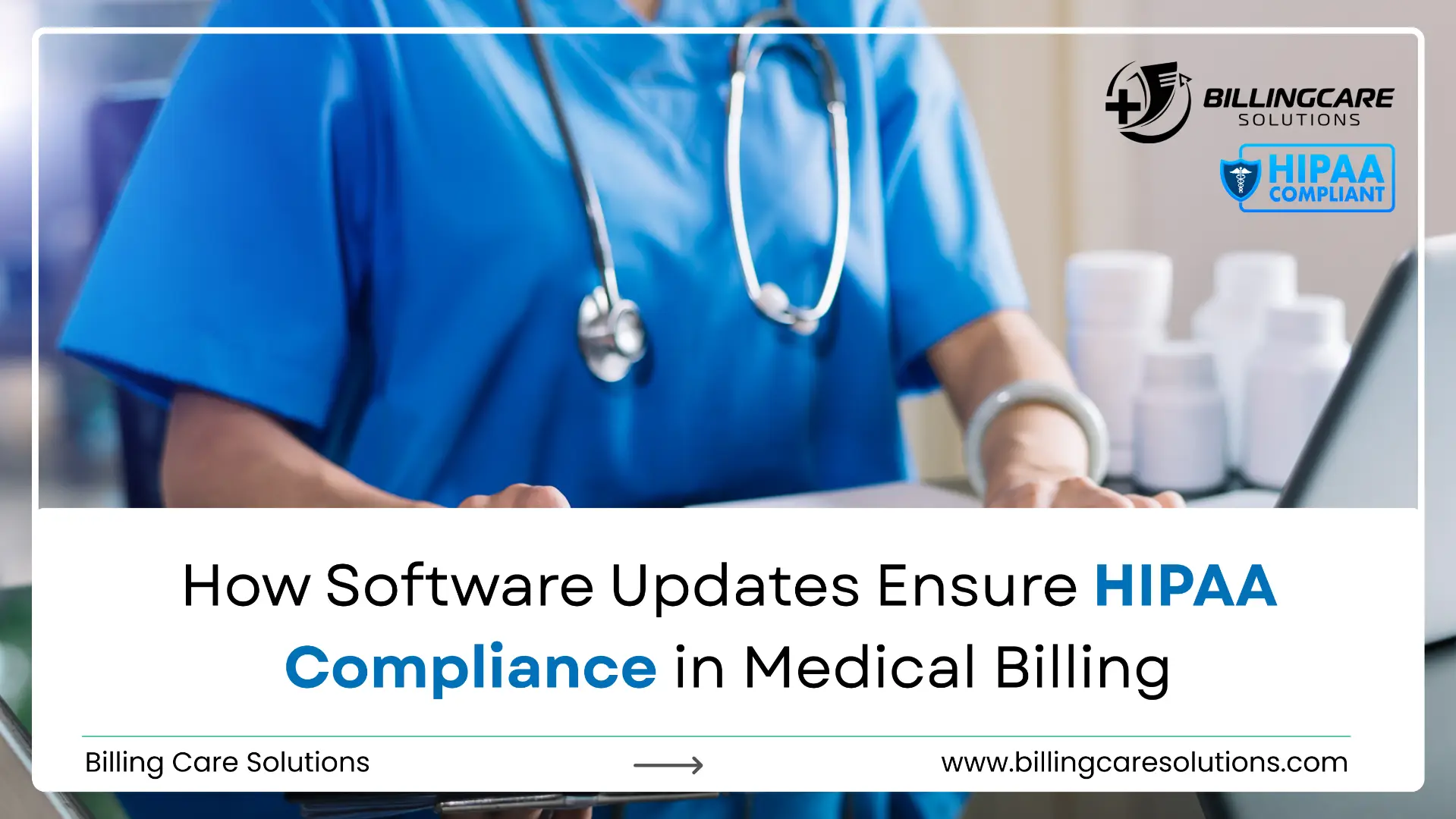How Software Updates Ensure HIPAA Compliance in Medical Billing
Stay protected and prevent HIPAA compliance violations. Learn how timely software updates reduce risks, secure billing data, and keep medical practices audit-ready.

Medical billing holds great significance in managing the finance section of the healthcare system. However, since billing systems process and store sensitive patient information on a daily basis, they are two of the most heavily targeted areas for cyberattacks, as well as receiving the most inspections in terms of healthcare regulatory compliance.
Compliance with medical billing policies is a requirement for healthcare providers of all sizes as HIPAA regulations make it a necessity. In the case of failing to secure sensitive information, a healthcare business is likely to owe expenses due to fines, lose valuable support and face a legal battle in court. One widely ignored and yet very important aspect of electronic protective measures is software maintenance.
In the case of software updates, ignoring such policies could lead to the system ignoring core system vulnerabilities, failing to meet, HIPAA’s evolving demands and even undermining the security framework of billing operations. Failure to meet policies and restrictions can lead sensitive information to be collected, compliance to be ignored, and a revenue blockage.
This guide explores how software updates support HIPAA compliance, common risks when updates are skipped, and best practices to implement them effectively in medical billing environments.
How Updates Support HIPAA Compliance
1. Fixing Security Flaws:
Hackers are constantly looking for out-of-date systems with known vulnerabilities. Security patches that address these vulnerabilities are frequently included in software updates. Your billing software may be exposed to ransomware attacks, unauthorized access, or data leaks if it isn't updated, all of which would be dangerous HIPAA violations.
For instance, if a billing platform fails to update its older encryption library, claim files could be intercepted. An update guarantees that data is encrypted according to the most recent standards.
2. Complying with the Technical Regulations of HIPAA:
HIPAA mandates that business associates and covered entities use technical protections like encryption, audit logs, and access controls. These protections are regularly strengthened by updates that:
Enhancing role-based access controls to ensure that employees only see what they require.
Improving audit trail features to track activity and access.
Keeping encryption protocols up to date for safe data transfer.
Practices run the risk of lagging behind changing compliance requirements in the absence of these improvements.
3. Keeping Up with Changes in Regulations:
Regulations related to healthcare change over time. For instance, interoperability guidelines and revisions to the HITECH Act affect the handling and sharing of patient data. Updates are frequently released by software vendors to take these regulatory changes into account. Your billing system maintains compliance with the most recent regulations by implementing updates.
4. Facilitating Safe Integrations:
Medical billing is not a standalone event. EHRs, clearinghouses, and payer platforms are frequently integrated with systems. Updates maintain the compatibility and security of these connections.
An immediate HIPAA violation can occur from ePHI leaks caused by an outdated API or an unsafe data transfer method between billing and EHR software. Updates guarantee that integrations stay dependable and encrypted.
Typical Scenarios Related to Updates, Neglecting Updates, Delaying Updates, and Updating Incorrectly & oversight are not uncommon ways for even thorough procedures to run the risk of failure.
Here are some scenarios to help you to learn:
Scenario 1: Updates Delayed to Avoid Interruption to Work Flow
A billing department purposefully takes on critical updates in a way that disrupts their work. Then a few weeks later, a ransomware event occurs that exploits a vulnerability they should have patched.
Scenario 2: Notifications Off across Devices
Users decided against receiving notifications on their devices, and user workstations have auto-updated while others have not. Now there are mismatched protections and your compliance is missing gaps.
Scenario 3: Vendor delays
A practice depends on a billing vendor for updates, and the vendor is very slow getting patches out. In the meantime, the practice is operating under former known threats, unaware of the exposure.
Scenario 4: New features lead to missing processes
An update introduces more restrictive role-based access. The business already knows the key functions, but now job functions are slowed for billing tasks because some staff don't have the same access as before.
Best Practices for Implementing Updates in a HIPAA-Compliant Manner
In order to avoid the mistakes that were made as described above, here are some good practices to follow:
1. Formalize your Update Policy
Create a written and formal update policy that addresses the following: When an update will be applied (immediate for critical patches, monthly for regular updates). Who will be responsible for applying the updates (internal IT, vendor, or MSP). What documentation is needed if there is an audit.
2. Test Updates in a Sandbox
Try to test updates in a sandbox environment whenever possible prior to applying it, and this way you can work through any workflow problems or incompatibility issues without the risk of impacting production data.
3. Send out regular communication regarding updates
This allows staff to manage workflow and reduce interruptions. When updates occur, this is usually before or during a regular maintenance window or scheduled plans (i.e., Sunday evenings). If staff know that updates will occur in this timeframe, then the update occurs without users feeling blindsided.
4. Document every update
Remember, HIPAA wants auditability! Document the following in the later if an audit occurs: Date and version of update Who applied the update What issues occurred How you verified that the update was successful Documenting your updates will offer you protection in the event of a HIPAA audit/investigation of your practice.
Checklist: Staying HIPAA-Compliant with Software Updates
- Written update policy in place
- Regular maintenance windows scheduled
- Critical patches applied immediately
- Sandbox testing for major updates
- Documentation logs maintained
- Vendor update policies reviewed
- Staff training after changes
- OS and hardware updates included
Reason Practices Choose Billing Care Solutions:
At Billing care Solutions, we help practices do more than "stay compliant." We create workflows that ensure your billing processes are secure, efficient and audit-ready.
We do this by Using HIPAA compliant billing practices and minimizing risks. Providing technology-based solutions that integrate safely into your EHR System. Using proactive denial prevention and compliance monitoring. Ensuring and tailoring ongoing support and staff training, and staying ahead of statute, regulations or program changes. With Billing Care Solutions, you don't just get billing support, you get a partner who wants to ensure that you are both financially stable and compliant with the latest HIPAA requirements.


